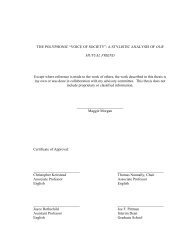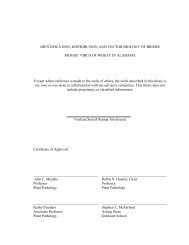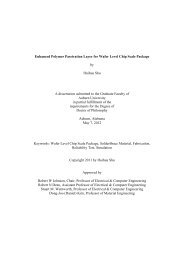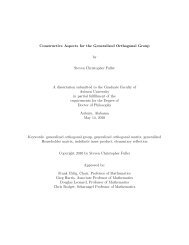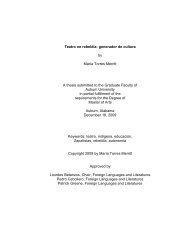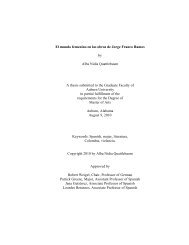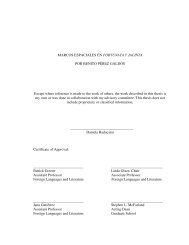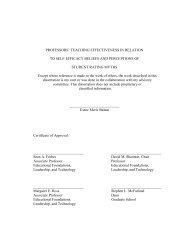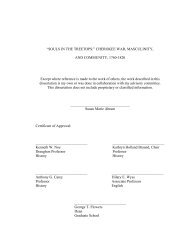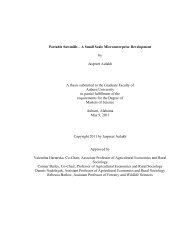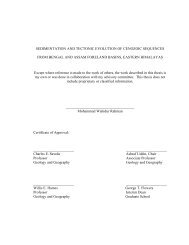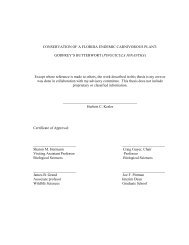the trouble with gender in othello - Auburn University Electronic ...
the trouble with gender in othello - Auburn University Electronic ...
the trouble with gender in othello - Auburn University Electronic ...
You also want an ePaper? Increase the reach of your titles
YUMPU automatically turns print PDFs into web optimized ePapers that Google loves.
Section Two:<br />
O<strong>the</strong>llo <strong>in</strong> <strong>the</strong> Matrix<br />
We will now turn our attention away from Desdemona’s disruption of <strong>the</strong><br />
patriarchy, and turn to O<strong>the</strong>llo’s. It is not only <strong>the</strong> fact of Desdemona’s<br />
disobedience to her fa<strong>the</strong>r, her violation of The Law of <strong>the</strong> Fa<strong>the</strong>r, which is<br />
represented as offensive <strong>in</strong> her relationship <strong>with</strong> O<strong>the</strong>llo. To beg<strong>in</strong> to explicate<br />
how O<strong>the</strong>llo’s <strong>in</strong>itial treatment of Desdemona is an encouragement of her <strong>gender</strong><br />
transgressions, as well as transgressive of his own scripted <strong>gender</strong> performance,<br />
we must beg<strong>in</strong> by look<strong>in</strong>g at <strong>the</strong> words of Brabantio. Brabantio never refers to<br />
Desdemona by name. “My daughter! My Daughter! She is abused, stolen from<br />
me, corrupted!” (I.iii.65, 68) None <strong>in</strong> <strong>the</strong> ga<strong>the</strong>r<strong>in</strong>g of city fa<strong>the</strong>rs even considers<br />
ask<strong>in</strong>g Desdemona if she voluntarily ran away <strong>with</strong> O<strong>the</strong>llo. It takes O<strong>the</strong>llo to<br />
suggest this radical idea: “I do beseech you, send for <strong>the</strong> lady to <strong>the</strong> Sagittary and<br />
let her speak” (I.iii.128-130) although, when speak<strong>in</strong>g to Brabantio and <strong>the</strong> Duke,<br />
O<strong>the</strong>llo does refer to Desdemona as “his(Brabantio’s) daughter”, it is O<strong>the</strong>llo<br />
who refers to her <strong>the</strong> most as Desdemona. In all of Act I, Desdemona is called by<br />
name six times, four of <strong>the</strong>m by O<strong>the</strong>llo (<strong>the</strong> only o<strong>the</strong>r person to refer to her by<br />
name is <strong>the</strong> Duke). While O<strong>the</strong>llo is, of course, not free completely of <strong>the</strong><br />
patriarchal ownership idea of possession of wife or daughter, that Brabantio<br />
only refers to her as “my daughter” can be viewed as <strong>in</strong>dicative that he only<br />
views Desdemona as a possession, while O<strong>the</strong>llo’s more frequent use of her<br />
20




